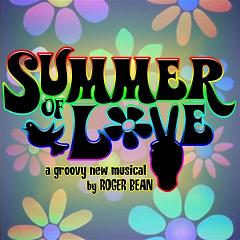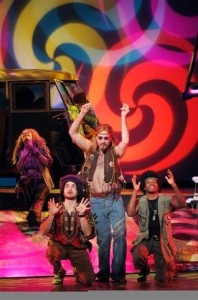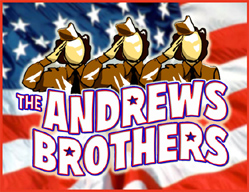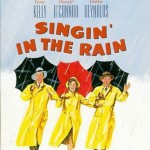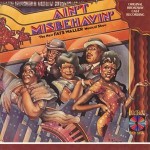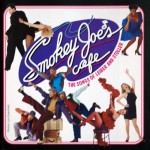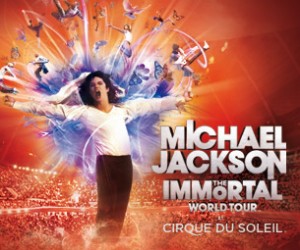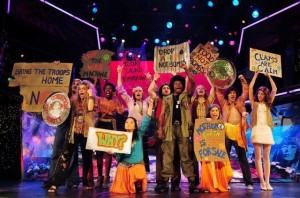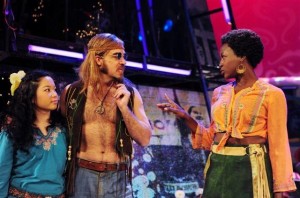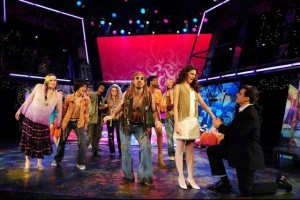TAKING JUKEBOX MUSICALS TO TASK
Grab those love beads and tie-dye shirts, smoke a bowl, and head down to Long Beach to hear kick-ass songs from the 60s and 70s delivered with professional gusto – songs which take you back to your early years when…wait, that’s too simple.
Okay, how about this? In Summer of Love, Roger Bean’s world premiere presented by Musical Theatre West at the Carpenter Performing Arts Center, a runaway bride rethinks her life among the adorable, oh-so-groovy and Hair-like hippies in the Haight-Ashbury district of 1967 San Francisco. It is a perfectly agreeable, albeit contrived, innocuous and blasé jukebox musical that…. No. Hang on, I’ll get it.
Were it not for the hash-filled haze of the Baby Boomer’s inchoate memory, they might see that Summer of Love oversimplifies a complicated time. As with drugs themselves, recognizable tunes merely serve to shut down the brain so that we won’t notice that a very clever writer couldn’t even come up with a story…. Hmmm, maybe a little too harsh?
This sweet and creamy treat may please the palette with each memory-jostling top ten hit, but the proliferation of jukebox musicals such as Summer of Love threaten to clog the arteries of American Musical Theatre. Instant gratification is fine until we realize that we are veering farther and farther from nourishing theatre. It is theatrical Chinese Food – just after some tasty dialogue and tunes, we are immediately hungry for something more substantial…
Actually, all of the above are accurate, but clearly, as with the jukebox musical itself, things are not as simple as they seem. Mr. Bean’s sunny shows (Life Could Be A Dream, The Andrews Brothers, The Marvelous Wonderettes) may encourage more mature (shall we say) audiences into purchasing a season subscription to their local Civic Light Opera, but the forecast looks gloomier when we consider the effect that jukebox musicals are having on the landscape of the theatre in general. Since the genre intends to stick around as long as you (yes, you) keep attending them and I (yes, I) keep reviewing them, let’s start at the very beginning:
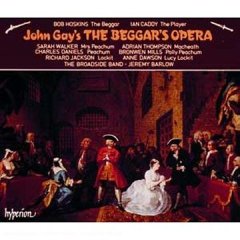
In 1728, John Gay wrote the first (and most successful) ballad opera entitled The Beggar’s Opera, a satirical play with original lyrics set to familiar melodies of the time, including folk tunes and church hymns. The original production is cited as the longest running theatre production up to that time – the enormous success being attributed to the fact that audience members could hum along to the trendy tunes while relating to ordinary characters. Theatre historians surmise that this was the genesis of the Jukebox Musical: a genre in which formerly released, popular songs are contextualized into a dramatic plot. (If The Beggar’s Opera sounds familiar, that is because Brecht and Weill converted it into The Threepenny Opera two-hundred years later.)
The term “jukebox musical” was actually created in the 1940s in reference to movies which integrated well-known ditties into a newly conceived plot. When MGM producer and mastermind Arthur Freed conceived a great story as a vehicle for his catalog of songs from previous MGM musicals, the result was Singin’ In The Rain (1952).
However, it wasn’t until the 1970s that the music of popular artists became the raison d’être for producing a musical on Broadway. Often, the book came off as a mere afterthought, if, indeed, there was a book at all. In 1978, the soul-filled Ain’t Misbehavin’, based on the music of Fats Waller, became a well-deserved smash hit, but to this reviewer, it was the astounding success of the soulless, homogenized and book-free Smokey Joe’s Café (1995), based on the music of Stoller and Lieber, which surely points to the day the (original) music died: the jukebox musical was now validated to the point-of-no-return. However, even with the Broadway success of Ain’t Misbehavin’ (1,604 performances) and Smokey Joe’s Café (2,036 performances), no more than ten jukebox musicals were produced worldwide in the last three decades of the twentieth century.
The next turning point was Mamma Mia! (London, 1999), whose worldwide financial success proved that audiences were willing to look beyond a twaddle-filled book just so they could be treated to the enormously popular music of ABBA. The film version actually magnified the awfulness of the script – even the songs could not hide its unpalatability. (Likewise, Rock Of Ages (2006), which this reviewer found improper, insipid and insulting, has folks lining up at the box office to hear the music of the glam metal bands of the 1980s.)
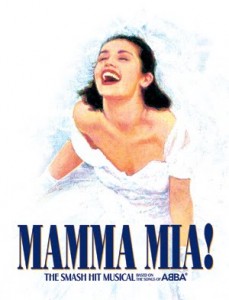
Since musicals have become hyper-costly to produce, backers must see a return on their investment if they are to provide the cash for future productions. Recognizable tunes are a big draw to middle-of-the-road theatergoers who like their theatre accessible and unchallenging (think Vegas Tourists); thus, these hybrid shows of the old-and-new tend to be an easier sell than, say, Sondheim or the avant-garde. That is why, only ten years into this century, over FORTY jukebox musicals have hit the boards, threatening to suffocate the impetus for the creation of original musicals, just as “reality TV,” which is not really reality, is drowning original programming on the tube. Even the trailblazing Cirque du Soleil organization has recently produced Vegastravaganzas based on an artist’s body of work: The Beatles LOVE, Michael Jackson THE IMMORTAL World Tour, and the hugely disappointing Viva ELVIS.
There are glimmers of hope: all of the hot dancing in Maurice Hines’ Hot Feet (also 2006) could not save the dumb book, which is the story of The Red Shoes using the music of Earth, Wind and Fire! The other hope is that a brilliantly crafted, character-driven book will become the mainstay of jukebox musicals, as was achieved with Jersey Boys, in which the songs of The Four Seasons complimented a great story about (of all things) The Four Seasons. Until then, we are stuck with homogenous, safe, and utilitarian manifestations wherein an asinine book is thrown together just to get to the next familiar tune (hopefully before the audience realizes that they are being duped), an act that is analogous to spiking the punch.
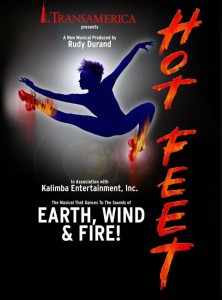
* * * * * * * * *
Getting back to Summer of Love, it is an unwieldy mix of the asinine and the entertaining, the latter largely due to Mr. Bean’s ear for song selection and delightful dialogue – but there is no story. The only through-line centers on a jilted groom, Curtis (Doug Carpenter), who follows his runaway bride Holly (Melissa Mitchell) after she happens upon a rag-tag group of hippies who live in Golden Gate Park. As wonderfully staged and executed as some of the musical numbers can be, the story is not enough to make the evening exciting, even as it manages to be superficially pleasing.
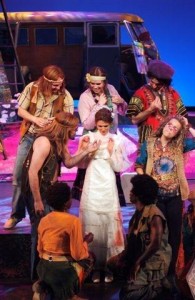
Hair and Alice In Wonderland collide in Haight-Ashbury as the couple interacts with the ten groovy cats in this San Francisco enclave, including stoner River (Eric Anderson), his sexual partners Saige (Christine Horn) and Daisy (Katrice Gavino), gay hairdresser Coyote (Michael J. Willet), and peace-loving, flower girl Janis (Callie Carson). As each hippie educates the troubled couple in the ways of the counter-culture movement, themes of chosen family, acceptance and mind expansion magically resonate. The problem is that the conflict-free goings on are so rife with plucky spirit that the golly-gee-gosh, concert-like proceedings are incongruous with the era it purports to celebrate. All of the great music and ideas of love become useless without structure. As any hippie will tell you, it doesn’t matter how great the marijuana is if you don’t have the paper to roll it in.
It’s all peace and love and harmony as Mama (Victoria Strong), a philosophy-spouting, wise-woman-of-the-woods, advises Curtis to give Holly some space. When Curtis asks Mama how she ended up in Golden Gate park, she speaks in New Age generalizations – we never figure out just who in the hell she is. One can only guess that she is an image of an underdeveloped stock character who hopes one day to be a full-fledged human being with a back story.
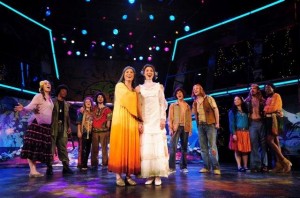
As director, Mr. Bean missed an opportunity to develop a much needed, site-specific setting. Instead of creating a realistic backdrop of Golden Gate, Michael Carnahan’s set, with the band above and on either side of the performers, serves only as a concert venue. Jean-Yves Tessier lights up the stage like a psychedelic Christmas tree while Shon LeBlanc’s costumes, although authentic enough, seem to be a little clean for people who live on the ground. Lee Martino’s choreography may be tight, but it vacillates from back-up singer arm thrusts to modern dance for beginners. The look of the show needs to be grounded in reality, as was done with the 1960 basement setting of Bean’s charming Life Could Be A Dream. MTW is to be commended for producing this well-intentioned evening, but it would have served the show if Mr. Bean had not directed his own material.
As with his previous outings, the arrangements and music direction, here by Michael Borth and Michael Paternostro, are flawless and electrifying. Ms. Mitchell’s version of “Valley of the Dolls” is achingly lovely, and Mr. Willett’s gay anthem-like take on “Somebody to Love” is wildly infectious. Each of the twenty-three numbers worked well with gorgeous harmonies and powerful performances.
As great as some of the numbers are, however, we are left without hope or fear, sadness or happiness, despair or elation – just a faint fuzzy feeling that dissipates as soon as we leave the theatre. You may also be disconcerted: after bridegroom-to-be Curtis is coerced into taking a hit of acid, poignant images of Vietnam (projections by Lianne Arnold) backlight the cast as they earnestly rock the haunting riff of “Darkness, Darkness.” Then it’s back to the joy. At the final curtain, the man next to me said, “All we need now is for Sandy the dog [from Annie] to come on stage.”
Summer of Love needs more bite and less fluff. It seems that creators of jukebox musicals take advantage of our need for the familiar and end up insulting our intelligence. (Familiarity breeds contempt?) It is my fervent wish that Roger Bean will work with a great story writer and visionary director in his future endeavors – that is, until he runs out of decades to pull music from.
photos by Alysa Brennan
Summer of Love
ends on April 17, 2011
for tickets, visit MTW
